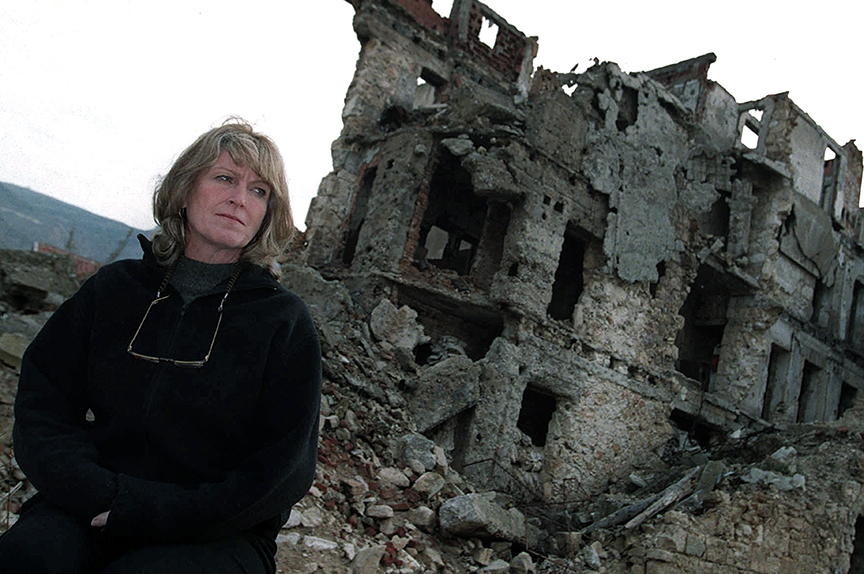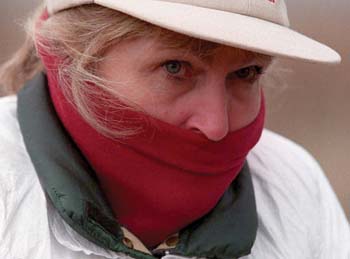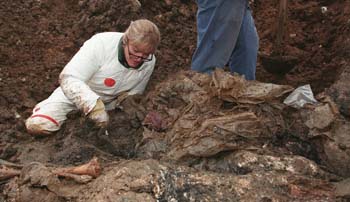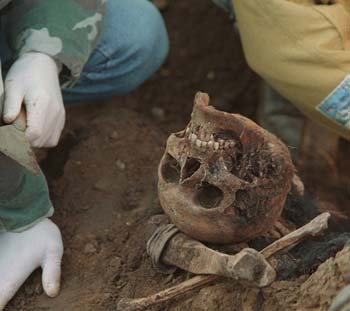
Digging up the truth is Jill Cobb’s bare-bones mission. But in her line of work, the truth rarely makes a clean entrance.
A veteran forensic pathologist, Jill Cobb '77 has pulled some dark truths from some dark places around the world. In 1998, she slogged through mud, snow and worse in Bosnia, in the ugly aftermath of the former Yugoslavia's civil war, to monitor and assist in the exhumation and identification of war casualties.
“We worked for Physicians for Human Rights,” Cobb recalls. “My husband George (Thomas) was in charge of the identification program. He identified the victims of war crimes, while I worked in the field, doing exhumations and autopsies.” Cobb’s involvement with the Boston-based Physicians for Human Rights organization began while she and her husband, also a forensic pathologist, were students at Johns Hopkins University in Baltimore, where they were both pursuing master’s degrees in international public health.
Right after graduation, they left for war-mangled Bosnia, a country with an overwhelming need for forensic pathologists. At the time Cobb and Thomas arrived to help, an estimated 20,000 war victims were missing. In 1998, Physicians for Human Rights monitored the exhumation of more than 1,800 people in Bosnia — and Cobb was witness to some 400 of them.
Her professional purpose meshed exactly with that of the human rights organization: to ease the suffering of victims’ families by ending uncertainty about the fate of their loved ones, thus extracting some measure of peace from the horrors of war. “What I hope to come out of this,” Cobb told Laura Rauch of The Wichita Eagle in 1998, “is that the world will recognize what happened in this country.”
Ethnic cleansing was what happened; neighbor killed neighbor. One of six republics that once comprised the nation of Yugoslavia, Bosnia and Herzegovina followed the lead of two fellow republics — Slovenia and Croatia — in declaring its independence in 1992.
This action sparked internal strife among Bosnia’s three main ethnic groups: the Muslims, Croats and Serbs. After three years of warfare, a U.S.-brokered peace accord in 1995 established a loosely federated government roughly divided between the Republika Srpska, or Serb Republic, and the Muslim/Croat Federation of Bosnia and Herzegovina. In 1996, a NATO peacekeeping force was installed in this uneasy and bloody land.
“You can hear about war,” Cobb says. “You can see it in movies; you can read about it in books — but until you’ve been there and seen what it does, you really cannot understand it. And even then, the atrocities we saw can never be explained away. For some reason you think, ‘Well, those people are different from us. They have different customs. They have different ideas about life and death. But guess what? They are no different than you and I. They get up in the morning and go to work. They go to parties. They laugh and tell jokes. They love their spouses and children. They want what is best for them. They just want to enjoy life.”

warm while waiting for
a backhoe to uncover
a grave site in Modrica.
While progress has been made in reclaiming a sense of security and ordinary life for the peoples of Bosnia during the years since Cobb felt the bite of a fierce Balkan winter and smelled, too often, the “significant, unique smell of death” rising from the mass graves of Bosnian Muslims, Croats and Serbs alike, the fact that serious concerns persist is evidenced by the continued presence of some 7,000 international troops under the EU Force Command after the Dec. 2004 hand-over from NATO's Stabilization Force.
And according to a 2005 United Nations report, “Incidents continue to occur in certain areas, including killings and beatings, violence directed against properties as well as incidents of harassment and vandalism of religious premises.”
Cobb is greatly saddened by the harsh realities of human existence she sees so graphically in her work. Yet she has learned to maintain a sense of balance. From her current post in New Zealand, she explains, “When we returned from Bosnia, George and I had an opportunity to fill in at the Sedgwick County medical examiner’s office.
We found that we liked ‘filling in,’ and that is what we have been doing since. Working part-time gives us time to recoup. We have met many wonderful people during our experiences, and we try to spend as much time as we can reconnecting with them. We like to renovate houses and love to travel. There are about a dozen countries on my list to visit yet. Hopefully this winter, we will visit Vietnam and Korea, where George served as a flight surgeon during the Vietnam War.”
A Matter of Attitude
A Wichita native and graduate of North High, Cobb was 27 years old and the mother of five when she enrolled at Wichita State. She recalls, “The reason I started college was — the light bulb went on. During your life, chances are you are going to have to support yourself and maybe your children. Do you want a job that is menial, unrewarding, low paying and a waste of your God-given talents? Or do you want to do something that is interesting, rewarding and monetarily satisfactory? The answer was easy.”
Cobb’s neighbor Flora Marymont ’86, the wife of a Wesley Hospital pathologist and mother to two sons thinking about medical school, decided to earn a business degree at WSU, and she talked Cobb into going with her.
“Jill was a stunningly beautiful, smart, industrious woman,” Marymont says. “And she worked very hard. She would drive her children to their events — but she always had a book with her.”
Cobb recalls, “Flora was interested in accounting. I wasn’t interested in accounting, but thought I could find something that would be good for me. After my first semester, I was hooked!”
The mainspring behind Cobb’s new-found love of higher education was N. Henry Pronko (1908-98), the psychology professor who taught one of her first classes at WSU: Psychology 100. “I remember,” she says, “Dr. Pronko said that the best attribute one could have in order to succeed was a good attitude. I couldn’t change my IQ; I couldn’t control what my finances were, but I sure could decide what kind of attitude I would have.”

a mass grave near Zdrijelo in the Republika Srpska
in 1998.
Another key influence on Cobb was William G. Eckert, a world-recognized forensic pathologist who taught at the university. Eckert, who died in 1999, led or assisted in such high-profile forensic investigations as the Pan Am Flight 103 air disaster over Lockerbie, Scotland, that killed 270 people in 1988.
“Dr. Bill Eckert offered a forensic class that was wonderful,” Cobb relates. “I took the class to see if I could really stomach the forensic science — burned bodies, decomposition, etc. I used to hide my eyes in class when he had his slide show. I didn’t know how I could get used to it, but I did know, it was a matter of attitude. Thank you, Dr. Pronko.”
Cobb calls her time at Wichita State “a joy.” She explains, “I had absolutely wonderful teachers at WSU. They were all very knowledgeable about their fields of expertise, but they also had another quality, an interest in their students — every single one of them, from the English department, to the anthropology department, to the science department. I guess I should include the mathematics department too, since they got me through the math courses and, believe me, that was not an easy job.”
She also credits her time in WSU classrooms as the origin of her fascination with faraway places and peoples. “Another of my favorite teachers,” she says, “was Dr. Taylor, who taught American studies. I liked his class not only for the information he gave us, but also we had a number of international students in the class. I believe that is where I first developed my interest in countries outside the USA.”
When asked if she has a capstone memory of or feeling for her alma mater, Cobb responds: “Gratitude — for the teachers, the opportunity, the experience and the knowledge.”
A Sense of Wanderlust
After deciding during her senior year at WSU that medical school would be her next educational venture, she applied for and received a premed scholarship named for George Farha, a Wichita physician and the founding chair of the University of Kansas School of Medicine-Wichita’s department of surgery.
“The financial assistance was greatly appreciated,” Cobb says. “The vote of confidence helped even more. It was like my hopes and aspirations were now validated.”
Lynn Stephan ’64/92, who became friends with Cobb during their high school years together, relates, “When I learned that Jill had undertaken such an ambitious plan of action, I couldn’t get over it — I was so impressed.” To pay for medical school at the University of Kansas, Cobb took a Kansas scholarship that requires a commitment to practice within the state for a specified period of time after graduation.
“It’s a great plan,” she says. “It offers students a chance to get the education they might not otherwise be able to afford. In fact, right now here in New Zealand there is a ‘brain drain’ problem. After their students finish medical school, they have such an enormous debt that they leave the country to practice medicine elsewhere in order to pay off their medical school bills. I’ve been encouraging the medical school here to adopt the same plan that we had so they can keep their bright minds at home.”
Cobb knew she wanted to be a forensic pathologist when she began her medical studies.
But, she admits, “I didn’t know if I could get through all the pathology. Again, great teachers came to the aid of this older female with all the kids. Their support was wonderful, especially at a time when my children were teenagers and I was torn about their welfare versus my education. But we made it through okay. Two of my children are lawyers; one is an insurance executive in Wichita, and one works for Garvey.” (Sadly, one of her sons died.)
After Cobb finished her medical studies, she worked in Colorado at the Denver coroner’s office and then became the coroner for Arapahoe County. She has not found it difficult to find jobs.

remains to be photo-graphed for
documentation in a grave in Modrica,
also in Srpska.
“It seems there is always a critical shortage of forensic pathologists,” she explains. “The reasons are low pay compared to other physicians, long hours, unpleasant situations and the court experience. Many physicians don’t like appearing in court, and I do have to admit, it’s not always a pleasant experience, but it is part of the job.”
It was in 1989 in the wake of the 1983 U.S. invasion of Marxist-controlled Grenada that she first plied her forensic skills overseas. “I helped out in Grenada for Project Hope. That’s where I became interested in medicine in developing countries,” she says and adds, “I have a problem with wanderlust. I won’t be happy until I see it all.”
After her successful career in Colorado, she and Thomas took a year off in 1991 to travel the world. “We did some volunteer work in Agra, India, at the Shanti Mangeleck Hospital,” Cobb recalls. “All this just whetted my appetite for foreign medicine.”
In l993, the couple relocated to Topeka, Kan., where Thomas served as Shawnee County coroner and Cobb worked as a pathologist throughout Kansas. “I started covering various counties, driving around the state up to 1,200 miles a week,” she says.
“We worked in Kansas until 1997 when I got this idea to get a degree in international public health at Johns Hopkins. And now, here we are in Wellington, New Zealand. We had been filling in in Stockton, Santa Barbara and Modesto, California, and in Seattle and Spokane, Washington, and Eugene, Oregon, when this opportunity came up. We have signed on for one year, but do not want to stay here permanently as I do miss home and my family. New Zealand is a wonderful country and quite beautiful. What a life, right!”
Cobb’s and Thomas’ home base has been Medford, Ore., since 1998.
At Home in the Garden
When out of the morgue, Cobb reads (one of her favorite books is Theodore Dreiser’s American Tragedy) and indulges in two hobbies in particular. “For the last six months I have taken up pottery,” she reports. “Now, that is a great hobby.
You can make all the coffee cups you want, and you can apply some of those skills you learned in college, like chemistry and physics, when you formulate your clay and glazes. I never knew when I learned about oxidation and reduction how fascinating it would be when I take my raku pots out of the kiln.”
She also loves to dig in her garden. “Am I a successful gardener?” She laughs. “No, but I keep trying.”
In the wider world, sad to say, that is not the only kind of spadework required.





